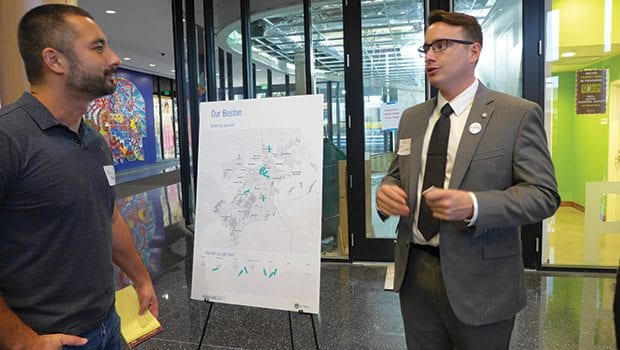
Imagine Boston 2030 held its first open house last week at the Bolling Building. The organization invited representatives of neighborhood and tenant associations to review data and offer feedback, questions and concerns.
Members of city departments stood by foam boards displaying charts and graphs on each of the planning organization’s nine themes: Housing; Mobility; Parks and Open Spaces; Prosperity and Equity; Land Use, Design and Placemaking; Health and Safety; Environment and Adaptation; Learning and Arts, Culture and Creativity.
The goal of the event was to find out what communities want and how better to engage them, said John Fitzgerald, deputy director of Imagine Boston 2030.
“We’re absorbing. We’re not presenting anything and saying, ‘What do you think about this?’ It’s a blank slate. It’s the people’s plan,” he said.
“We’re hoping to build excitement about what planning can be,” said Sara Myerson, executive director of Imagine Boston. She emphasized that this is a very early stage of planning.
Any and all concerns
Attendees milled around the space, replied to posted questions by writing answers on sticky-notes and asked questions. The event was intended as a broad information gathering session and attendees’ concerns ranged widely.
Visitors presented ideas ranging from a call for protected bike lanes and rapid bus transit in East Roslindale (from Lisa Beatman, director of Jamaica Plain Community Center Adult Learning Program) to a suggestion that saltwater city pools are be healthier than chlorine (from Andrea Howley of Jamaica Hill Association). Faith Arter of Mass Midtown Cultural District said she envisioned an expansion of the theater district and the introduction of a film festival.
The topic of housing and jobs, major concerns in many parts of the city, were raised as well.
Karen Chen, co-director of the Chinese Progressive Association, spoke of a need to raise low-income residents into the middle class instead of building housing to bring middle-class people into the community from outside.
“We need to keep people here but lift them up,” she said. “[Middle income] needs to grow but not grow from the outside.”
Attendees like Gary Webster, constituency director for City Councilor Michelle Wu’s office, and Lisette Le, civic engagement coordinator of Right to the City Boston, said they also were attending to get a sense of what the city is planning and how it is gathering ideas.

Posters and flip charts were arrayed around the space, displaying information and questions on each of Imagine Boston’s nine themes.
Interconnected issues
Discussions, and the presence of the various themes in one room, reflected the many interconnections among aspects of the city’s plan.
Ensuring continued access to housing, said Webster, allows residents to appreciate the other city developments.
He said his main concern is “that in 2030 the people [of the neighborhoods] are still here to enjoy it, to reap the benefits of all these good things [that Imagine Boston intends]. It really starts with housing. If you can’t afford to live there, you can’t enjoy the schools, parks.”
In turn, better jobs allow people to afford that housing and rising rents.
“The same people being pushed out of housing are in low-wage jobs,” Chen said. “It’s all related: education, jobs.”
Myerson said Imagine Boston’s nine themes are intended to demonstrate how multidisciplinary and comprehensive a city plan can be.
Whatever emerges from the idea gathering, Atyia Martin, Chief Resiliency Officer, said she will bring a perspective of racial equity and community inclusion to the planning discussion.
“Whatever people say are top things they want to focus on, I can take an equity lens to and look at them,” she said.
Communication exploration
Following this open house, Imagine Boston will hold further sessions, inviting different groups to each one, said Fitzgerald. (He would not say which groups).
In order to expand outreach beyond what they are able to achieve in these large events, the organization also is offering “visioning kits,” suggestion boxes and questionnaires conducted through texting.
Visioning kits are essentially meetings in a bag, said Fitzgerald. The kits contain information to spark discussion and suggestion cards that can be filled out and dropped off. The kits become available for pickup from City Hall this week, said a member of the Imagine Boston team who asked not to be identified by name, and also can be requested by email.
Other options: suggestion boxes located at community centers, health centers and some police stations around the city, said Fitzgerald.
Digital discussions
Imagine Boston also relies on digital tech. On October 7, the organization launched an initiative that — through an app called Textizen — allows people to engage by texting answers to multiple choice questions or open-ended statements presented by Imagine Boston. One query: “My life in 2030 will be better with…”
They received more than 1,000 responses in the first week, according to Fitzgerald.
When a texter responds, he or she will receive another prompt. Three of these are content-based questions and two are demographic, said the Imagine Boston team member.
Fitzgerald said options like these will facilitate citizen participation by those who may not be able to come out for a meeting, such as single moms or families with several children.
Imagine Boston’s information gathering will run until December, Myerson said. A draft city plan will be opened to public review in winter or spring of 2017, according to Imagine Boston’s website.






